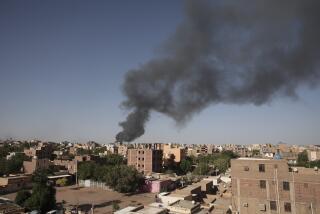Mubarak Views Ousted Sudan Leader as Eccentric : Numeiri Both Ally, Headache for Egypt
- Share via
CAIRO — For more than a year, Egypt has viewed the behavior of Sudan’s president, Jaafar Numeiri, as eccentric and his political longevity as a liability, but the neighboring countries are linked by their mutual dependence on the Nile River and the closest alliance in the Arab world.
So when Numeiri’s white Boeing 707 jetliner touched down in Cairo on Saturday, carrying the Sudanese president en route back to Khartoum from Washington, President Hosni Mubarak was at the airport to greet--and perhaps counsel--the man whose country’s stability has always been crucial to Egypt’s own well-being.
Numeiri, his bronzed face bearing self-inflicted tribal scars of his initiation into manhood, wore a gray business suit and talked quietly as he and Mubarak walked into the airport presidential lounge for two hours of private discussions. There Mubarak confirmed the news, broadcast from Khartoum by way of Nairobi only minutes before, that the Sudanese armed forces had taken power and ended Numeiri’s 16-year rule.
Determined to Return
According to highly placed Egyptian sources, Numeiri was determined to return to Khartoum anyway. He strode to his plane and for five minutes he and Mubarak stood at the ramp, with Mubarak trying to persuade him that it was too dangerous to return. Finally, Numeiri nodded and, solemn-faced, his eyes on the ground, headed back to the airport to accept a helicopter ride to a government guest house where his political asylum presumably would begin.
That presented Mubarak with a dilemma. He will need to establish good working relations immediately with the new Sudanese regime, yet harboring the man it overthrew might be an obstacle. At the same time, he does not want to turn his back on Numeiri, who has been a loyal friend to Egypt and was one of only two Arab leaders not to cut diplomatic ties when Egypt made peace with Israel in 1979.
“Of course Numeiri has alienated a lot of people, but I don’t think the new regime will hold it against us for keeping him,” a senior Egyptian official said. “It is traditional for Arabs, particularly Sudanese, to take asylum here, and I think the new regime would rather have him in Cairo than running around someplace else. In a way, this can work to everyone’s advantage.”
Syria, Libya Applaud
Egypt had no official reaction to the coup, but two radical Arab states, Syria and Libya, applauded the overthrow, largely because Numeiri had aligned himself with those willing to make peace with Israel and because, as an ally of Egypt and the United States, he represented all that the hard-liners reject.
Syria, according to news agency reports, said that Numeiri’s downfall should be a lesson to other pro-American regimes, and Libya extended immediate diplomatic recognition to the new government. Most other Arab governments probably will be accepting of the change as long as the new regime remains moderate and on good terms with the West.
Egyptian intelligence sources did not find Libya’s initial response significant nor do they believe that the new Sudanese leader, Gen. Abdul-Rahman Suwar Dahab, has ties to Tripoli or any other foreign capital. They note that Libya’s ruler, Moammar Kadafi, has constantly tried to undermine Numeiri and would have welcomed any change in leadership.
The Egyptian intelligence reading--which is usually accurate in Sudanese affairs--is that the coup was not really plotted or planned, but rather was a spontaneous result of public discontent exerting political pressure on the army to show moral leadership. The soldiers had the choice of responding to the demands in the name of Numeiri or the name of the people, and they chose the latter.
Low-Profile Soldier
Gen. Dahab is well known to Cairo officials. He traveled here often as army commander in chief, the post he held before Numeiri placed him in charge of all of the armed forces as defense minister on March 18. He is described as a low-profile soldier with no apparent political ambitions. “He has never been a star and no one gave him much notice,” one Egyptian official said.
Egypt’s uneasiness with Numeiri, though never publicly spoken, was well known over the past year. As Numeiri’s situation began unraveling in the face of internal economic and political woes, Mubarak went on record saying that he would help protect the Numeiri regime militarily in case of foreign intervention--a reference to Libya--but would not interfere in internal unrest. He repeated the policy in an interview only four days ago.
Although never publicized, Egypt has a training center for army officers and an air force presence in Sudan. The two countries are joined by a 25-year defense pact, signed in 1976, and an agreement for economic integration, signed in 1982. Mubarak has often spoken of Egypt and Sudan being “one country secured by the same artery,” the Nile, whose flow, which can be controlled by Sudan, is crucial to Egypt’s survival.
Egypt became uneasy with Numeiri--as did Saudi Arabia and other so-called moderates--after he began surrounding himself with advisers of the mystical Sufi Islamic sect and, in September, 1983, adopted Islamic law. Mubarak feared that the fundamentalist tide could spill over into his own country and force him to adopt similar measures, a move that would have resulted in alienation of Egypt’s 6 million Christian Copts.
In numerous private meetings, Mubarak tried to persuade Numeiri to take a more reasonable approach, Arab diplomats said. Mubarak also was concerned that Numeiri’s hard-line policies against non-Muslim rebels in southern Sudan would lead to increasing instability in the country.
More to Read
Sign up for Essential California
The most important California stories and recommendations in your inbox every morning.
You may occasionally receive promotional content from the Los Angeles Times.










